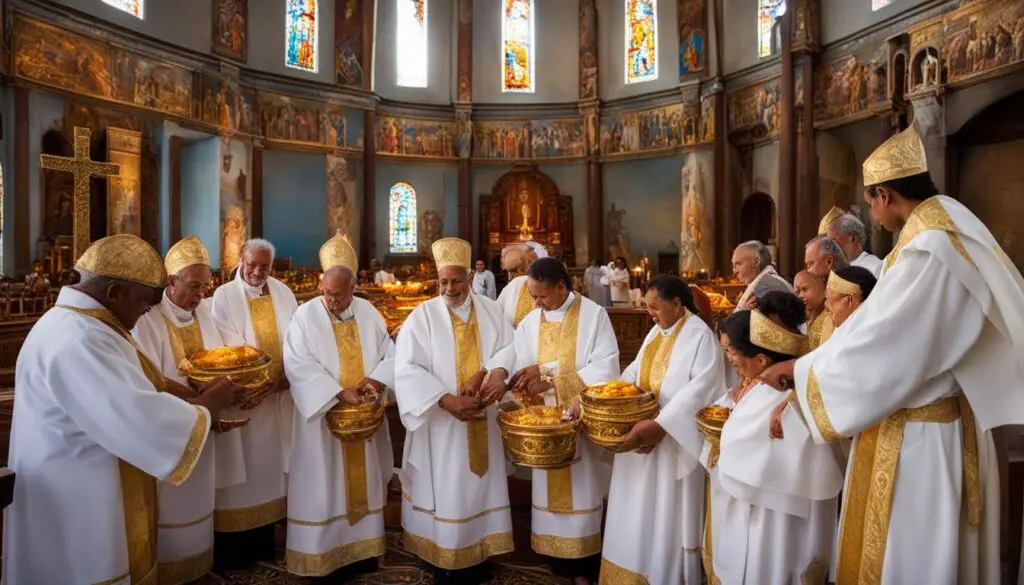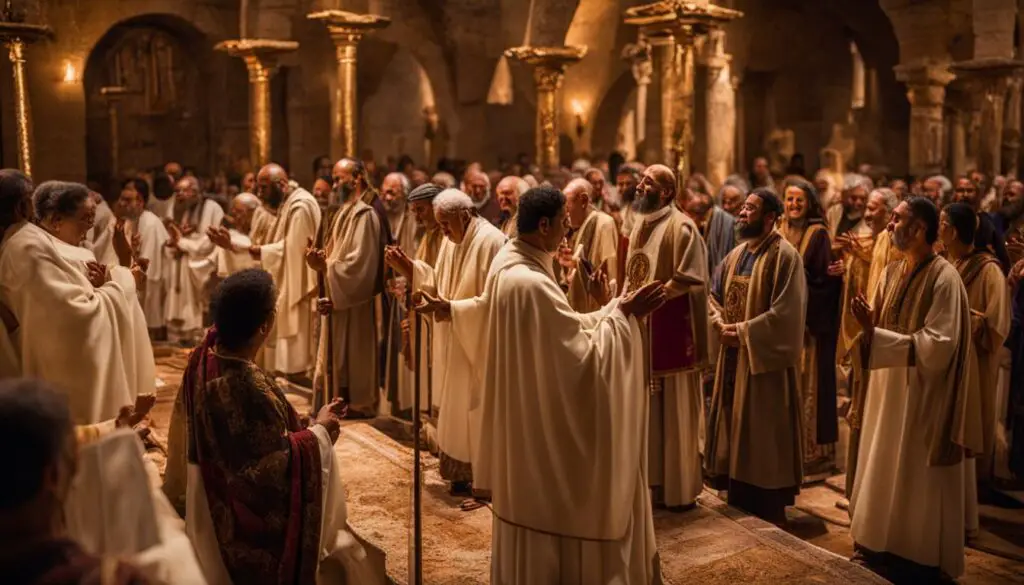The Ephesian Church, also known as the Church in Ephesus, holds a significant place in biblical history as one of the early Christian churches. Founded by the Apostle Paul during his missionary journeys, this ancient and historic church played a vital role in shaping the religious community of its time.
Ephesus, located in modern-day Turkey, was a thriving center of travel and commerce in the ancient world. As multiple major roads led to and from the city, it became a hub for diverse cultures and ideas. In this context, the Ephesian Church emerged, blending both Jewish and Gentile believers into a vibrant religious community.
However, as with any religious institution, the Ephesian Church faced its share of challenges throughout its existence. False doctrines and doctrinal drift infiltrated the community, gradually diminishing its love for God. Despite its eventual decline in the second century, the impact of the Ephesian Church on early Christian history remains significant.
Key Takeaways:
- The Ephesian Church was founded by the Apostle Paul during his missionary journeys.
- Ephesus, located in modern-day Turkey, served as the hub for the church’s diverse and vibrant religious community.
- The church faced challenges such as false doctrines and a decline in its love for God over time.
- Despite its eventual decline in the second century, the Ephesian Church’s impact on early Christian history is significant.
- The history of the Ephesian Church serves as a reminder of the importance of remaining grounded in sound doctrine and nurturing a deep love for God.
Beliefs and Doctrines of the Ephesian Church
The Ephesian church, an early Christian church founded in the city of Ephesus, held steadfast beliefs and doctrines under the teachings of the Apostle Paul. Their faith was rooted in the love and grace of Jesus Christ, with an emphasis on sincere devotion.
However, as time passed, the Ephesian church faced the challenge of doctrinal drift. Certain individuals within the community began teaching strange doctrines, speculations, and myths that strayed from the true administration of God. These false teachings prompted a rebuke from the Apostle Paul, who called for repentance and a return to sound doctrine.
The Ephesian church serves as a poignant reminder of the significance of remaining grounded in authentic and sound doctrine. It highlights the importance of guarding against the influence of false teachings and staying true to the foundational principles of the New Testament church.
“As I urged you when I went into Macedonia, stay there in Ephesus so that you may command certain people not to teach false doctrines any longer.” – 1 Timothy 1:3 (NIV)
Staying faithful to the teachings of the Apostle Paul and the New Testament scriptures became paramount for the Ephesian church to maintain its identity as a strong and thriving religious community.
| Beliefs | Doctrines |
|---|---|
|
|
The Ephesian church’s commitment to sound doctrine serves as a timeless lesson for believers today. It reminds us to carefully discern and reject doctrines that deviate from the true teachings of the New Testament. By remaining rooted in the foundational principles of the faith, we can uphold the truth and protect the integrity of the Christian community.

Let us now delve into the sacraments and rituals observed by the Ephesian church, shedding light on their worship practices and the significance of their leadership and clergy within the religious community.
Sacraments and Rituals in the Ephesian Church
The Ephesian church, like many early Christian churches, practiced various sacraments and rituals as part of their faith. These practices were deeply significant and served to strengthen the believers’ connection with God and each other.
Baptism: A Rite of Initiation and Identification

One of the central sacraments in the Ephesian church was baptism. Through baptism, believers publicly declared their faith and their identification with Christ’s death, burial, and resurrection. This symbolic act represented a spiritual rebirth and served as a rite of initiation into the church community.
The Lord’s Supper: Commemorating the Sacrifice of Christ
Another significant sacrament observed by the Ephesian church was the Lord’s Supper, also known as Communion or the Eucharist. This ritual involved partaking of bread and wine, symbolic of Jesus’ body and blood. The believers gathered together to remember and commemorate the sacrifice of Jesus Christ, expressing their gratitude for His love and grace.
Regular Worship Gatherings: Prayers, Hymns, and Teachings
The Ephesian church likely participated in regular worship gatherings, where they engaged in prayers, sang hymns, and received teachings. These gatherings served as occasions for communal worship and deepened the believers’ understanding of their faith. Through songs of praise, heartfelt prayers, and the sharing of biblical teachings, the church members grew in their love for God and their knowledge of His Word.
These worship gatherings also fostered a sense of community among the believers, as they came together to honor and worship God as a united body of believers. The Ephesian church understood the importance of worship as a means of drawing closer to God and building strong bonds of fellowship with one another.
Comparison of Sacraments and Rituals in the Ephesian Church
| Sacraments and Rituals | Description |
|---|---|
| Baptism | Rite of initiation and identification with Christ’s death, burial, and resurrection |
| The Lord’s Supper | Communion to commemorate the sacrifice of Jesus Christ |
| Regular Worship Gatherings | Prayers, hymns, and teachings shared in communal worship settings |
The sacraments and rituals in the Ephesian church were not merely empty ceremonies; they held deep spiritual significance and helped the believers grow in their faith and devotion. Through baptism, the Ephesian Christians publicly declared their identification with Christ, while the Lord’s Supper served as a powerful reminder of Jesus’ sacrifice. The regular worship gatherings provided opportunities for communal worship, prayer, and biblical instruction, fostering a sense of community among the believers.
Leadership and Clergy in the Ephesian Church
The leadership and clergy played a vital role in the growth and development of the Ephesian church, an early Christian community founded by the Apostle Paul. As one of the key leaders and teachers of the church, Paul dedicated a significant amount of time in Ephesus, imparting knowledge and addressing false doctrines.
Alongside Paul, the church appointed a group of elders to oversee the spiritual affairs of the community. These respected leaders were entrusted with the responsibility of guiding and shepherding the believers, ensuring their faithful adherence to sound doctrine and the overall well-being of the congregation.
“Remember your leaders, who spoke the word of God to you. Consider the outcome of their way of life and imitate their faith.” – Hebrews 13:7
Leadership within the Ephesian church was characterized by a deep commitment to teaching, nurturing, and providing spiritual guidance. The clergy served as role models, exemplifying a strong faith and dedication to serving God and the community.
Responsibilities of the Church Leadership
The leaders and clergy in the Ephesian church undertook various responsibilities to ensure the spiritual growth and unity of the congregation. These responsibilities included:
- Teaching and expounding the scriptures
- Offering pastoral care and counseling
- Administering sacraments and rituals
- Exhorting and encouraging believers
- Addressing and correcting false doctrines and practices
The leadership and clergy of the Ephesian church played a crucial role in preserving the integrity of the church and nurturing a strong and vibrant faith among the believers.

Leadership Lessons from the Ephesian Church
The leadership of the Ephesian church provides valuable lessons for leaders in contemporary religious communities. Some key takeaways include:
- Devotion to sound doctrine: The leaders in the Ephesian church were committed to upholding and proclaiming the truth of the Gospel. Today’s leaders can emulate this devotion by prioritizing the diligent study and faithful teaching of scripture.
- Shepherding with love and care: The leaders in the Ephesian church demonstrated a deep concern for the spiritual well-being of the believers under their care. Modern leaders can cultivate an attitude of compassion and genuine care for the members of their community.
- Defending against false teachings: The Ephesian church faced the challenge of false doctrines, and its leadership responded with sternness and corrective measures. Leaders today can stand against false teachings and equip their congregations with the knowledge and discernment to recognize and counteract such teachings.
The leadership and clergy of the Ephesian church set an example of selfless service, genuine love, and unwavering commitment to the Gospel. Their legacy inspires leaders today to lead with integrity, humility, and a profound dedication to the spiritual growth and well-being of their communities.
Worship Practices of the Ephesian Church
The Ephesian church, as an early Christian church, engaged in various worship practices that demonstrated their deep devotion to God and their desire to honor Him. These worship practices played a significant role in fostering a sense of unity and reverence within the Ephesian religious community.
One of the core elements of worship in the Ephesian church was the regular gathering for corporate worship. During these gatherings, the believers would come together to pray, sing hymns, and receive teachings from their leaders. This collective worship created an atmosphere of spiritual growth and allowed the believers to express their gratitude and awe for God’s grace and love.
Additionally, the Ephesian church actively participated in various spiritual disciplines, such as fasting and personal prayer. Fasting was seen as a way to seek God’s guidance and purify one’s heart, while personal prayer provided individuals with an opportunity for intimate communication with God. These practices helped to deepen the believers’ relationship with God and nourish their spiritual growth.
Spiritual Disciplines in the Ephesian Church:
- Prayer: The believers in the Ephesian church valued prayer as a means of communicating with God. They would dedicate time to seek God’s guidance, offer their thanks, and express their burdens and desires.
- Fasting: Fasting was practiced as a way to demonstrate humility before God, seek His will, and grow closer to Him spiritually. It was seen as an expression of devotion and a path to spiritual renewal.
“Every act of worship and spiritual discipline was an opportunity for the Ephesian church to draw nearer to God and strengthen their faith.” – Apostle Paul
The worship practices of the Ephesian church were not just rituals; they were genuine expressions of their love for God and their desire to deepen their relationship with Him. Through prayer, hymns, teachings, fasting, and personal devotion, the Ephesian believers sought to honor God and live out their faith in a way that was pleasing to Him.

| Worship Practices | Description |
|---|---|
| Corporate Worship | The Ephesian church regularly gathered for corporate worship, where they prayed, sang hymns, and received teachings. |
| Prayer | Believers devoted time to personal and collective prayer, seeking guidance and communicating with God. |
| Fasting | The Ephesian church practiced fasting as a means of seeking God’s will and deepening their spiritual growth. |
Sacred Texts of the Ephesian Church
The Ephesian church revered the sacred texts of the New Testament as their authoritative scriptures. These texts, which included the letters written by the Apostle Paul, carried immense significance in shaping the beliefs, practices, and teachings of the church and other early Christian communities.
In particular, the letter to the Ephesians, authored by the Apostle Paul, held a special place within the Ephesian church. This letter emphasized the church’s faith and love, providing guidance and inspiration to its members.
The New Testament writings, including the letters of the Apostle Paul and the accounts of Jesus Christ and the early apostles, served as a guiding light for the Ephesian church. These sacred texts formed the foundation upon which the church built its doctrines, teachings, and understanding of the Christian faith.
The Ephesian church cherished these sacred texts as a means of deepening their relationship with God and strengthening their communal bond. The teachings within the New Testament scriptures nurtured their faith, imparting wisdom and direction for their spiritual journey.

The sacred texts of the New Testament were not merely words on a page; they were the living and breathing words of God that guided the Ephesian church in their pursuit of truth and righteousness.
The Ephesian church held the New Testament scriptures with reverence and committed themselves to studying, meditating on, and living out the teachings contained within. These sacred texts served as a source of inspiration, encouragement, and instruction for the entire religious community.
Through the sacred texts, the Ephesian church found solace, guidance, and a profound connection to their faith. They recognized the power and authority of these writings as they sought to uphold the principles and values of the early Christian movement.
The sacred texts not only defined the doctrines and beliefs of the Ephesian church but also played a crucial role in shaping their identity as a religious community. The scriptures provided a common ground upon which the members of the church could unite, serving as a source of unity and cohesion.
In the sacred texts of the New Testament, the Ephesian church found an unwavering foundation for their faith, a spiritual compass that guided their every step, and a constant reminder of the love and grace of God.
Denominations and Sects in the Ephesian Church
The Ephesian church, as part of the broader Christian movement in the first century, likely had different denominations and sects within its community. These divisions may have arisen due to varying interpretations of certain doctrines or practices. However, the early church leaders, including the influential Apostle Paul, placed a strong emphasis on unity among believers and the importance of love and mutual edification.
Despite potential divisions, the Ephesian church was characterized by its multiethnic and diverse makeup, reflecting the inclusive nature of the early Christian movement. This diversity brought together Jews and Gentiles, creating a rich tapestry of believers from different backgrounds and cultures who were united in their faith in Jesus Christ.
| Denominations | Sects |
|---|---|
| The Pauline Church | Gnostic Sects |
| Faction of Apollos | Nicolaitans |
| Judaizers | Ebionites |
Various denominations and sects might have emerged within the Ephesian church, each with its own unique interpretation of Christian teachings. The Pauline Church, following the teachings of the Apostle Paul, likely held a prominent position in the community. Gnostic sects with their mystical and esoteric beliefs might have also been present. The faction of Apollos, a prominent preacher mentioned in the New Testament, may have attracted a particular group of followers.
Additionally, Judaizers who sought to combine Jewish customs with Christian practices and the Ebionites, who believed in a Jewish-Christian synthesis, might have formed separate groups within the Ephesian church.
However, despite potential divisions and differences, the Ephesian church was encouraged to maintain unity, love, and mutual edification. The Apostle Paul emphasized the importance of these principles in his letters to the church, urging believers to avoid divisions and strive for unity in their faith.
Unity and Love: A Message for Today
The example of the Ephesian church reminds contemporary believers of the significance of unity and love within the Christian community. In a world marked by divisions and differing interpretations of faith, it is essential to cultivate a spirit of unity and mutual respect among believers.
Just as the early Ephesian church was diverse and inclusive, today’s Christian communities can embrace individuals from various denominations and sects, recognizing the value of different perspectives and interpretations of the Scriptures. By prioritizing unity and love, Christians can demonstrate to the world the transformative power of the Gospel and foster a collective witness that transcends divisions.
Community and Outreach of the Ephesian Church
The Ephesian church was not only a religious community but also an active force in outreach and building a sense of unity and love among its members. They deeply cared for one another, demonstrating grace and compassion in their interactions. Led by the teachings of the Apostle Paul, the Ephesian church nurtured a spirit of inclusivity and sought to create a welcoming and accepting environment for all believers.
The outreach efforts of the Ephesian church went beyond their own community. They actively shared the Gospel message with those outside their congregation, spreading the good news of Jesus Christ to the surrounding community. This evangelistic mission was fueled by their genuine love for others and their desire to see lives transformed through faith.
The Ephesian church was also committed to serving the needs of the poor, marginalized, and less fortunate. They recognized that true faith is not just about words but about actions. They sought to embody the teachings of Jesus Christ, who taught his followers to love their neighbors as themselves. Through acts of kindness, generosity, and support, the Ephesian church demonstrated a tangible expression of their faith.
“For you were called to freedom, brothers. Only do not use your freedom as an opportunity for the flesh, but through love serve one another.” – Galatians 5:13
The Ephesian church also provided support and encouragement to fellow believers within their congregation. They understood the value of community and the need for spiritual growth and mutual support. The Ephesian church actively engaged in fellowship, prayer, and mutual edification, strengthening their bonds and deepening their faith.
With a commitment to community and outreach, the Ephesian church exemplified the early Christian emphasis on living out their faith through love and service. Their actions reflected the teachings of Jesus and the Apostle Paul, inspiring believers to follow their example even today.
Conclusion
The Ephesian church holds great historical significance in the early Christian movement. Founded and nurtured by the Apostle Paul, this thriving and diverse religious community played a pivotal role in shaping the trajectory of early Christianity. Despite facing challenges such as doctrinal drift and a decline in their love for God, the Ephesian church demonstrated unwavering devotion, unity, and a steadfast commitment to serving others.
Today, the Ephesian church serves as a powerful reminder of the importance of remaining grounded in sound doctrine and nurturing a deep love for God. Its legacy continues to inspire believers to actively participate in their communities and engage in outreach, spreading the Gospel message to the world.
The Ephesian church’s rich historical significance is evident in its architectural and artistic features, which have been excavated and preserved. These physical remnants serve as tangible reminders of the faith and dedication of this early Christian community.
While the Ephesian church eventually declined and faded from existence, its impact on Christian history remains indelible. It stands as a testament to the enduring power of faith, unity, and love, and its story continues to resonate with believers around the world.
FAQ
What is the history of the Ephesian Church?
The Ephesian church was founded in Acts 18 and mentioned in the book of Revelation. It was located in the city of Ephesus in modern-day Turkey and was a thriving center of travel and commerce. The Apostle Paul played a significant role in planting and nurturing the church during his missionary journeys. The early years of the church were marked by growth and vitality, but it faced challenges such as false doctrines and a decline in its love for God before eventually dying out in the second century.
What were the beliefs and doctrines of the Ephesian Church?
The Ephesian church held beliefs and doctrines taught by the Apostle Paul and documented in the New Testament. Their faith centered on the love and grace of Jesus Christ. However, they faced doctrinal drift over time, with individuals teaching strange doctrines that deviated from the true administration of God. The Apostle Paul rebuked them and called for repentance, emphasizing the importance of remaining grounded in sound doctrine.
What sacraments and rituals did the Ephesian Church practice?
The Ephesian church practiced baptism as a rite of initiation, symbolizing the believer’s identification with Christ’s death and resurrection. They also participated in the Lord’s Supper, or Communion, to commemorate the sacrifice of Jesus Christ. Regular worship gatherings, including prayers, hymns, and teachings, were likely part of their rituals, fostering a sense of community and deepening their understanding of faith.
Who were the leaders and clergy of the Ephesian Church?
The Apostle Paul played a pivotal role as one of the key leaders and teachers of the Ephesian church. He spent a significant amount of time in Ephesus, addressing false doctrines. The church also had elders who oversaw the spiritual affairs of the community, guiding and shepherding the believers.
What were the worship practices of the Ephesian Church?
The Ephesian church likely gathered regularly for corporate worship, engaging in prayers, hymns, and teachings. Their worship services were characterized by reverence for God and gratitude for His grace. They may have also participated in disciplines such as fasting and personal prayer, fostering intimacy with God and collective expression of faith.
What were the sacred texts of the Ephesian Church?
The Ephesian church regarded the New Testament writings, including the letters of the Apostle Paul, as their authoritative scriptures. These writings provided guidance for their beliefs, practices, and teachings, containing the instructions and teachings of Jesus Christ and the early apostles.
Did the Ephesian Church have different denominations and sects?
Though not explicitly mentioned, it is likely that different denominations and sects existed within the Ephesian church community. These divisions may have been based on interpretations of doctrines or practices. However, early church leaders like the Apostle Paul emphasized unity among believers and the importance of love and mutual edification.
What was the community and outreach of the Ephesian Church?
The Ephesian church actively built a sense of community and engaged in outreach. They cared for one another, demonstrated love and grace, and served the needs of the poor and marginalized. They also shared the Gospel message with the surrounding community and offered support to fellow believers, reflecting the early Christian emphasis on living out their faith through love and service.
What is the historical significance of the Ephesian Church?
The Ephesian church was a diverse and thriving religious community founded and nurtured by the Apostle Paul, holding great significance in the early Christian movement. Despite facing challenges, the church demonstrated devotion, unity, and a commitment to serving others. Its legacy continues to resonate in Christian history.
















